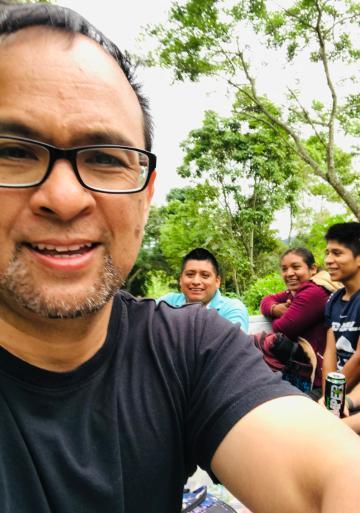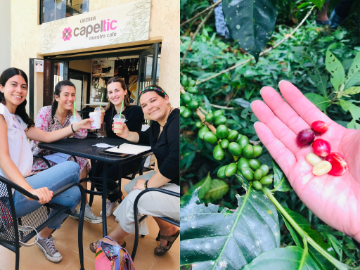
Through a CFIE funded research, I’m able to see first-hand a new movement that takes on the poverty-ridden coffee industry. Though it is not the fair trade coffee or a new pricing model that advocates a living income for coffee farmers. Instead, roasting coffee at origin is subtly emerging as a bottom-up solution, which can significantly add more value in the producing country.
That is, coffee growers themselves are leveraging roasting to capture the five capitals of sustainability: manufactured, financial, social, human, and natural. Although not without logistical challenges and market barriers, a growing but small number of coffee producers in underdeveloped regions of the world are taking steps to more fully “own” their coffee sales. These steps include cup tasting for quality control, selling at origin, and exporting branded roasted beans to global markets.
My research focuses on the case study of indigenous-owned Capeltic Café in Mexico. By design, Capeltic Café’s roasted-at-origin business aims to seize a fair deal for itself, learning how to scale and secure greater value from the coffee supply chain. Capeltic is a coffee cooperative with about 340 indigenous families. Its cooperative is located in Chiapas, a state with the largest indigenous population along with being the poorest and having the lowest per capita growth rate in Mexico.
Despite being constrained by Chiapas’ business environment, by 2006 Capeltic began to scale deep and wide. Today, all under one roof, Capeltic Café has a production factory, a roasting plant, a cup tasting lab, a coffee shop, and a business incubator. And because indigenous farmers do not have access to mainstream banking in Mexico, Capeltic has developed community credit lending to all its member families.
Field Visit During Covid-19 Impacts on the Return of Investment in Roasting at Origin

I recently returned from a field visit to Capeltic Café. The backdrop that helps me to understand the “why” of Capeltic appears to be the historic displacement of indigenous communities in Chiapas. In particular, Capeltic wants to redress their displacement caused by their exclusion in the policy-making process in Mexico. These policy issues include NAFTA/USMACA, labor out-migration, privatization of land, and the right to justice.
It is through this prism that I have been able to listen and accompany how indigenous farmer cooperatives structure their workplace, business model, and their encounter with others. Yet the business to readdress their displacement has been significantly complicated by the impacts of Covid-19. According to internal data, Capeltic’s growing profitability from coffee sales in Mexico has taken a nose-dive since the pandemic, while its nascent sales in the US is stalled.
At the same time, however, prior structural investments appear to allow Capeltic Café to weather the pandemic. From my observation, the sons and daughters of the coffee farmers, who staffed the Capeltic operation, are very focused on what they can do together presently. This comes through in their open meetings, which are about acquiring the skills and business networks to adjust and grow their sales in Mexican, US, and Canadian markets. Moreover, staff has been added to align Capeltic’s community lending to new businesses in pig farming and harvesting honey in order to keep household income above Mexico’s cost of food basket.
Bringing Capeltic Café to the Classroom and Students Serving with Indigenous Coffee Farmers
Importantly, the CFIE funded research has allowed me to connect Capeltic to the SCU mission: creating a more just, humane, and sustainable world. For example, students in my courses have learned that Capeltic’s model from “field to cup” to consumers everywhere was initially designed by and invested through the Jesuit mission network in Latin America. The Jesuit community — including SCU Ignatian Center — continues to support Capeltic through advising on human resource management, performance monitoring and project evaluation.
In response, a student-run microfinance, called ZiM, has imported coffee roasted-at-origin from Capeltic, so as to introduce the campus to a unique coffee experience. This roasted-at-orgin phenomenon also ensures that Capeltic’s farmers will capture the cost of coffee beans trickling into the cups of SCU faculty, staff, and students.
The first wave of ZiM Coffee is currently available through k-cups, which are completely decomposable; in fact, students are working over the summer to make ZiM’s k-cups fully biodegradable. Margin profits from the ZiM Coffee will go towards supporting Capeltic’s community credit lending.